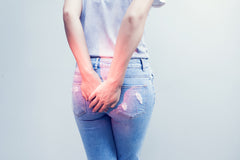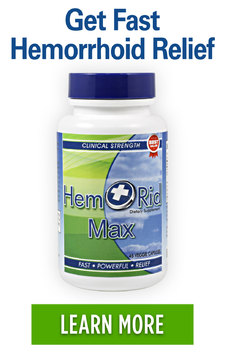What Causes Piles? Discover the Root Causes of Piles and What You Can Do
Posted on 16 September 2018 by Maryanne Johnson
Share this post
What is the Main Cause of Piles? Piles can take over a person's life, especially when they are reoccurring and symptomatic.
Patients with any of the two types of piles find themselves constantly on a quest to understand better this anorectal disease, what causes their development, and how to stop it.
Part of your treatment for piles will be in discovering the cause and targeting what needs to change in your lifestyle or your diet to prevent them.
Piles are in itself a complex condition that has no real answer as to what causes them to develop.
Studies and Research Show Factors Causing Piles
Studies and research suggest that the cause of development is a compilation of various factors.
If you are searching as to why you keep experiencing piles, take a look at this checklist to see if these variables are applicable to you.
Common Causes of Piles:
- You are in your late forties or early fifties
- Partake in frequent heavy lifting
- You are pregnant
- You have just given birth
- You have other preexisting gastrointestinal conditions
- Experience chronic constipation or diarrhea
- Spend long periods of time on the toilet
- Sit or stand for extended amounts of time
- Are overweight or obese
- Have a diet lacking fibre
In a nutshell, piles develop because of excess pressure from straining or something restricting the venous passages in the lower rectal area.
There are many factors that can place additional or abnormal amounts of pressure or constraint on the rectal veins and blood vessels, and it could be more than one actual cause.
The weakening of the supporting tissue in the anorectal area is largely to blame for the development of piles, and this is why piles are reported so often in patients approaching their fifties to sixties.
Some doctors and scientists theorize that the aging body, the collection of various connective tissues and rectal muscles weaken, caused by no particular reason other than age.
In the UK, most patients who seek medical treatment for hemorrhoids are in their fifties, supporting the idea that this common rectal condition peaks around this age point.
For patients that fall outside of this group of older adults, doctors find that these patients are experiencing abnormal intra-abdominal pressure from another cause.
As we age, toilet habits may be more difficult to manage. Research indicates that poor toilet habits can lead to a higher chance of having piles.
Specifically, this means constipation, irregular bowel movements, straining on the toilet, sitting on the toilet for lengthy amounts of time, and chronic diarrhea or other preexisting gastrointestinal disorders, can all contribute to the swelling and blockage of anorectal venous activity.
With constipation being a prevalent issue in older adults, this group of patients becomes increasingly susceptible to having piles.
The older we get, the more important it is to concentrate on a healthy diet and lifestyle to prevent health conditions such as piles.
Even for younger people, constipation can still play a hand in the presence of piles. Hemorrhoids are not exclusive to any particular category of patients and anyone can experience them.
Younger adults, teenagers, and even children can have piles, and in these cases, the piles can be attributed to lifestyle or disorders that cause straining during defecation, such as Irritable Bowel Syndrome (IBS), diverticulitis, or Crohn’s Disease.
When Pregnancy Causes Haemorrhoids
Another underlying cause could be pregnancy. For pregnant women, the growing uterus sits atop the rectal veins, tissues, and vital arteries, placing an unusual and consistent amount of pressure.
The collection of working venous channels experience constriction and impeded blood flow, and this lack of proper circulation for such a long and extended period of time causes inflammation and painful swelling.
For women who are fortunate enough to avoid developing painful piles during their pregnancy, they may not escape unscathed during labor.
Labor introduces long periods of straining and pushing, and this forces the rectal veins to swell, resulting in enlarged and painful piles.
Difficult labors can be the main reason behind postpartum piles for women who normally would not fall into a category of patients with higher risk of piles development.
Other instances that could lead to reoccurring and frequent piles can involve heavy lifting.
Manual labor jobs often introduce situations where heavy lifting is required by workers, and this takes a toll on their bodies beyond the physically obvious aches and pains.
Lifting incorrectly or engaging in too much heavy lifting stressed the abdominal and anorectal area, straining rectal muscles and corresponding veins, arteries, and soft tissues.
Piles and Your Diet
Your diet is notably critical when piles are concerned. A low-fibre diet is ubiquitous in many cases of piles, regardless of your age, gender, or lifestyle. A diet that lacks fibre will produce stools that are hard and difficult to pass, leading to straining and struggling on the toilet.
Stools without enough fibre can further irritate preexisting hemorrhoids as they pass through the rectal canal, abrasively coming into contact with internal hemorrhoids. As they strain to pass through the lowest part of the rectum, rectal bleeding can occur, and while this is a painless symptom, it can be an indication of internal piles.
Fibre is responsible for bulking the stools, which may seem counterintuitive, but it is the bulking that allows for the stools to retain more moisture, creating a soft, easily passable form.
Both soluble and insoluble types of fibre are essential components of the diet and are responsible for contrasting actions to promote healthy and regular colon activity.
Soluble fibre has demonstrated beneficial results for patients with piles. Forms of soluble fibre such as psyllium husk have produced positive results in dramatically reducing and subsiding symptoms of hemorrhoids.
If you find that you are not consuming enough fibre and are experiencing symptoms of piles, then you should consider discussing a fibre supplement with your GP.
Fibre supplements are available in powders, gummies, tablets, and capsules, allowing for the most comfortable choice of consumption.
Symptomatic piles respond well to an increased intake of fibre.
With additional fibre, symptoms of rectal bleeding, painful anal masses, itching, and burning have been shown to subside.
You will find fibre in whole foods, such as:
- Vegetables
- Fruits
- Nuts
- Beans
- Wheat bread
- Peas and legumes
- Seeds and oats
Fibre can be found in a variety of foods, but adults still have a difficult time managing meals that meet daily fibre requirements.
If you find that you are experiencing piles frequently, consider addressing a diet change first and foremost.
Although it is best to find fibre in whole foods, a supplement can help support a better diet, but it should not be used as a substitution.
For many adults, the diet is to blame for their piles. In combination with a lifestyle involving lack of exercise, hydration, and heavy lifting, there is a much higher chance of frequent and reoccurring symptomatic piles.
The research compiled on hemorrhoids suggests altering diet and lifestyle in small steps to ensure stable and consistent progress in dealing with piles.
Other Approaches to Preventing Causes
Diet and lifestyle modification remain the two most important methods in preventing and in treating piles. Outside of this, you can still do more. By practicing proper toilet habits, your piles have less of an opportunity to reoccur.
Piles are dependent on the restriction of the abundant flow of blood to the rectal area. If there is additional pressure or strain on the abdominal and anorectal muscles, venous channels, arteries, and supporting tissues, then you can expect to see piles form in a matter of days.
It may seem inconsequential by taking long bathroom breaks and sitting on the toilet for extended amounts of time, but by doing so, the blood cannot optimally flow, and the result can be piles.
Not passing stools as soon as your body needs to can also result in piles, so be sure to go to the toilet as soon as you feel you need to go. Holding in a bowel movement can cause inflammation of the rectal veins.
Conclusion
Piles will disappear within a few days, even without direct treatment or medical intervention. If you are unsure as to what is causing your piles, glance over the list of most common reasons behind as to why this anorectal condition occurs.
Begin your treatment by discovering if your diet or lifestyle is causing symptomatic piles and address the changes you must make with your GP.





0 comments